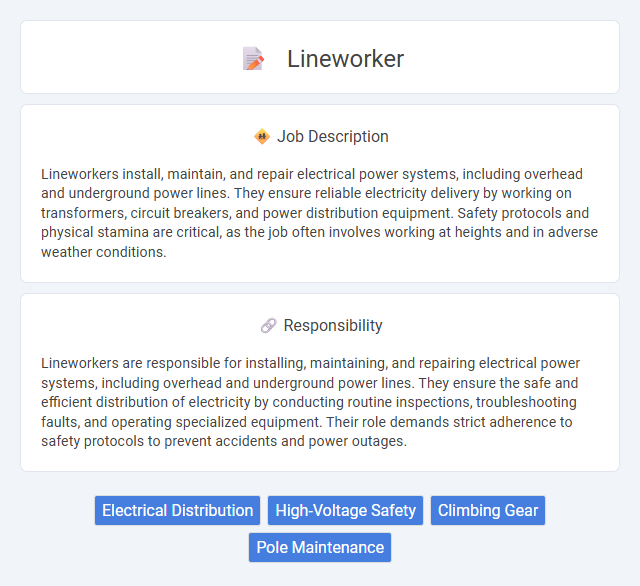
Lineworkers install, maintain, and repair electrical power systems, including overhead and underground power lines. They ensure reliable electricity delivery by working on transformers, circuit breakers, and power distribution equipment. Safety protocols and physical stamina are critical, as the job often involves working at heights and in adverse weather conditions.
Lineworker jobs may be best suited for individuals with strong physical endurance and the ability to work in high-stress, potentially hazardous environments. Those with a tolerance for heights, good hand-eye coordination, and quick decision-making skills are more likely to adapt well to the demands of this role. People prone to anxiety or with physical limitations might find the job challenging and less suitable.
Qualification
Lineworkers must possess specialized training in electrical systems, safety protocols, and equipment maintenance, often requiring completion of an apprenticeship program. Certification from recognized bodies such as the National Center for Construction Education and Research (NCCER) enhances job eligibility and validates technical skills. Strong physical fitness, problem-solving abilities, and knowledge of OSHA safety standards are essential qualifications for safe and efficient performance.
Responsibility
Lineworkers are responsible for installing, maintaining, and repairing electrical power systems, including overhead and underground power lines. They ensure the safe and efficient distribution of electricity by conducting routine inspections, troubleshooting faults, and operating specialized equipment. Their role demands strict adherence to safety protocols to prevent accidents and power outages.
Benefit
Lineworker jobs likely offer competitive salaries and comprehensive benefits packages, including health insurance and retirement plans. There is a high probability that workers receive paid training and opportunities for overtime pay. Safety programs and union representation may further enhance job security and worker satisfaction.
Challenge
The lineworker job likely involves significant physical and mental challenges due to the demanding nature of working at heights and in various weather conditions. Safety risks, including electrical hazards and heavy equipment handling, are probably common, requiring constant vigilance and expertise. Problem-solving skills and adaptability may often be tested when addressing unexpected outages or system failures.
Career Advancement
Lineworkers possess specialized skills in installing and maintaining electrical power systems, providing a strong foundation for career growth in the utility industry. Progression opportunities include advanced technical roles such as crew leader, electrical technician, or safety specialist, often supported by certifications like Journeyman Lineman or OSHA training. Enhanced expertise and leadership abilities can lead to supervisory positions, project management, and higher earning potential within energy companies.
Key Terms
Electrical Distribution
Lineworkers specializing in electrical distribution maintain and repair high-voltage power lines that deliver electricity from substations to homes and businesses. They install transformers, circuit breakers, and other essential components to ensure reliable energy transmission. Skilled in reading electrical schematics and adhering to safety protocols, lineworkers play a critical role in minimizing power outages and supporting grid stability.
High-Voltage Safety
Lineworkers specializing in high-voltage systems are trained to adhere to strict safety protocols to prevent electrical hazards and ensure operational reliability. They use insulated tools and personal protective equipment (PPE) such as voltage-rated gloves, flame-resistant clothing, and dielectric footwear to minimize the risk of electric shock and arc flash incidents. Comprehensive understanding of lockout/tagout procedures and live-line work techniques is essential for maintaining safety while working on energized high-voltage power lines.
Climbing Gear
Lineworkers rely on specialized climbing gear such as safety harnesses, lineman belts, and climbing hooks to perform high-elevation tasks safely and efficiently. Proper climbing gear ensures stability and protection while ascending and working on utility poles and transmission towers. Regular inspection and maintenance of this equipment are critical to prevent accidents and enhance job performance.
Pole Maintenance
Pole maintenance is a critical aspect of a lineworker's job, involving the inspection, repair, and replacement of utility poles to ensure electrical grid stability and safety. Lineworkers assess structural integrity, address weather damage, and install hardware to prevent outages and hazards. Expertise in climbing techniques, use of specialized tools, and adherence to safety protocols are essential for effective pole maintenance.
 kuljobs.com
kuljobs.com